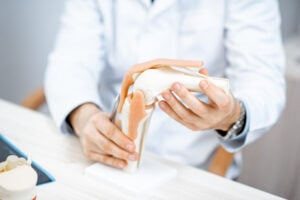A knee replacement operation may be commonplace these days, but it can be daunting like any surgery. In the UK, 93,911 knee replacement procedures were performed in 2020. Almost all patients (97.4%) were over 50, and the most common age group was between 70 and 79 years. Operations were more frequent on women, with 56.5% of all knee replacements being carried out on female patients and 43.5% on male patients.
In the United States, total knee replacement is the most common type of orthopaedic surgery, with over half a million surgeries performed annually.
There are four primary types of knee replacement surgery:
- Total knee replacement
- Uni-compartmental (partial) knee replacement
- Kneecap replacement (patellofemoral arthroplasty)
- Complex or revision knee replacement
Around 83 per cent of knee replacement procedures carried out in 2020 in the UK used a cemented fixation, where the surgeon uses a fast-drying cement to help the prosthesis stick to the bone. The alternative is to use a press-fit prosthesis where the bone grows onto it over time, but this is extremely rare these days.
We have drawn up a list of common questions and answers for people thinking of undergoing a knee replacement. The list covers procedures, potential complications, expectations for recovery and more.
Questions to ask your orthopaedic surgeon as you prepare for a knee replacement:
1. Is there an alternative to surgery?
- Chances are your consultant will already have tried a variety of treatments such as anti-inflammatory medication and steroid injections. They may even have recommended some complementary medicine, such as acupuncture. If these have not been successful, then it is likely that the best way to treat your ailment is through surgery.
2. What type of implant will be used?
There are four different types of knee replacement implants:
- Metal on plastic – the most common, thanks to its longevity, price, and safety record.
- Metal on metal – not as common today due to concerns of metal seeping into the bloodstream, causing inflammation and pain.
- Ceramic on plastic – using a ceramic femoral component instead of metal, this is suitable for people who are sensitive to nickel.
- Ceramic on ceramic – both femoral and tibial parts are made of ceramic, which is the least likely to cause reactions.
3. What are your knee replacement surgery outcomes?
Modern-day implants and surgical techniques mean that implants can last a long time for most patients. However, implants can fail at some point. When this happens, a knee revision surgery may be necessary. Revision rate of surgery is an important quality measure in joint replacement surgery, so should ask your surgeon about how many knee replacements they have performed and their outcomes. The best orthopaedic hospitals and surgeons are always open and transparent about their quality outcomes.
4. How long will my new knee last?
Statistics show that around 82 per cent of knee replacement joints last approximately 20-25 years. The lifetime, of course, depends on how you use your knee after surgery. Younger patients are more likely to need a repeat knee operation at some point in later life.
5. Should I be worried about the anaesthetic?
A knee replacement procedure will require the use of either a general or regional anaesthetic, an epidural or some combination of these. It is unusual for any problems to occur with this. Pre-surgery anaesthesia testing is always conducted to determine your risk profile and potential complications.
6. What is your approach to pain management?
You will be given medication to help cope with the pain after the procedure. A long-acting anaesthetic is commonly given at the end of the operation. You will also have pain-relieving medication to take at home.
7. How will I feel immediately after the operation?
You are likely to feel drowsy after the operation due to the anaesthetic, and your knee may have a drain attached to get rid of any potential build-up of excess fluid. You will probably be asked to keep your knee elevated. A compression bandage may need to be worn around your leg, and you will no doubt be given intravenous antibiotics to prevent any possible infection from occurring.
8. When will I be able to walk again?
You can expect to be up and about within a day of the operation. However, you will most likely need physical aid, such as crutches. A physiotherapist at the hospital will help you get used to moving with your new knee over the following weeks. After three to six months, you should be walking unaided.
9. Do I have to make any special adaptions to my home?
If you have stairs in your home, make sure there’s a bed on the ground floor that you can use for the first few weeks. It is a good idea to get rid of any clutter to reduce the risk of tripping and to fall on your new knee when you’re moving from room to room. A grab rail can prove invaluable for the bath or shower.
10. What does the post-surgery rehabilitation plan include?
Physical therapy usually starts with low-intensity movement. High-impact activities which involve running, jumping and skipping will be ruled out. Fitness enthusiasts may start swimming or cycling on a stationary bike around two months after the operation. Some hospitals may have a specialist in-house rehabilitation team or partner with rehabilitation centres to provide expert physiotherapy and rehabilitation aftercare.
It is worth remembering that the longer a knee replacement is delayed, the more complicated the procedure may become as the condition deteriorates. Second opinions are highly recommended before deciding on a major operation such as knee replacement.
Are you looking for the best knee surgeons abroad? We will soon be launching agency services to connect you with the best international orthopaedic surgeons. Sign up to stay informed.
















